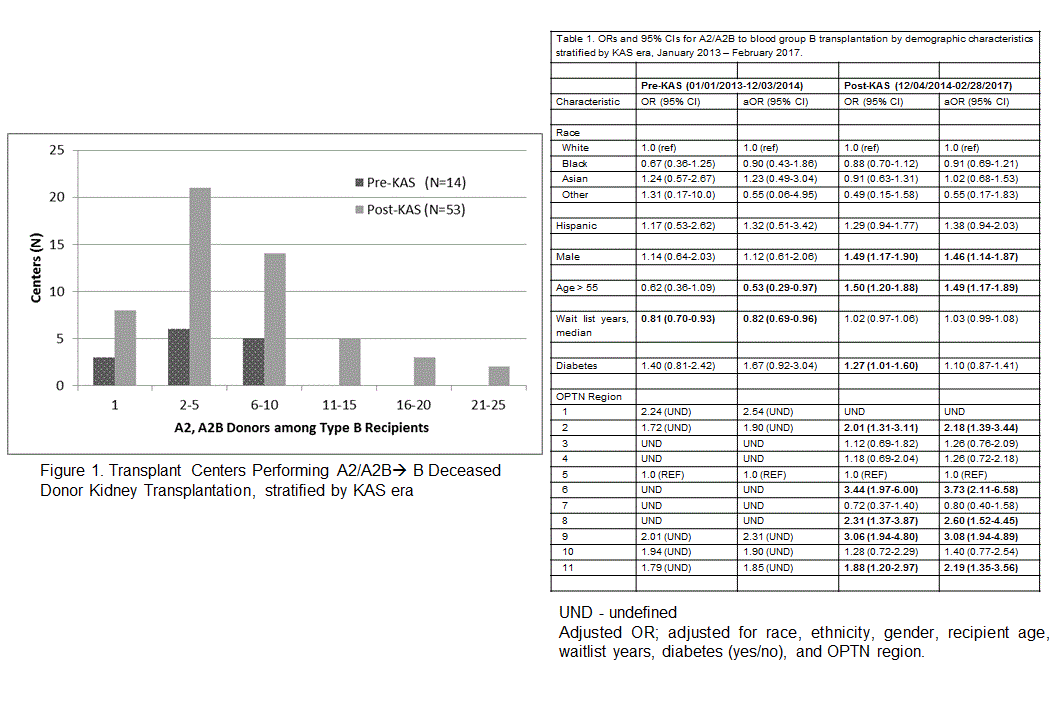Impact of the New Kidney Allocation System A2/A2B--> B Policy on Access to Transplantation among Minority Candidates
Paulo N Martins1, Margaux Mustian2, Paul A MacLennan2, Jorge A Ortiz3, Mohamed Akoad4, Juan C Caicedo5, Gabriel J Echeverri6, Stephen H Gray2, Reynold I Lopez-Soler7, Ganesh Gunasekaran8, Beau Kelly9, Constance M Mobley10, Sylvester M Black11, Carlos Esquivel12, Jayme E Locke2.
1Surgery, UMass Memorial Medical Center, Worcester, MA, United States; 2Surgery, University of Alabama at Birmingham, Birmingham, AL, United States; 3Surgery, University of Toledo Medical Center, Toledo, OH, United States; 4Surgery, Lahey Hospital and Medical Center, Burlington, MA, United States; 5Surgery, Northwestern Memorial Hospital, Chicago, IL, United States; 6Surgery, Colombiana de Trasplantes S.A.S., Bogotá, Colombia; 7Surgery, Albany Medical Center, Albany, NY, United States; 8Surgery, The Mount Sinai Hospital , New York, NY, United States; 9Surgery, California Area Industry Hospital & Health Care, Sacramento, United States; 10Surgery , Houston Methodist, Houston, TX, United States; 11Surgery, The Ohio State University Wexner Medical Center, Columbus, United States; 12Surgery, Stanford University , Palo Alto, CA, United States
American Society of Transplant Surgeons Diversity Affairs Committee.
Introduction: Blood group B kidney transplant candidates, many of whom represent ethnic minorities, have historically had diminished access to deceased donor kidney transplantation (DDKT). However, due to the decreased antigenicity of the blood group subtype A2, A2 incompatible (A2i) transplantation can be achieved successfully without the need for additional immunomodulation. Therefore, in an effort to address the ethnic and blood group disparity in access to DDKT, the new national kidney allocation system (KAS) implemented in December 2014, preferentially allocates deceased donor kidneys from blood group A2 and A2B donors to blood group B recipients. To date, no study has examined the impact of KAS on A2i DDKT rates overall for blood group B recipients or among ethnic minorities.
Materials and Methods: A case-control study of adult blood group B DDKT recipients was performed from 2013 through 2017, as reported to the Scientific Registry of Transplant Recipients. The likelihood of A2i DDKT was compared from the pre-KAS period (1/1/2013-12/3/2014) to the post-KAS period (12/4/2014-2/28/2017) using multivariate logistic regression.
Results: Following the implementation of KAS, there was a 4.9-fold increase in the likelihood of A2i DDKT for blood group B recipients, compared to the pre-KAS period (OR 4.92, 95% CI: 3.67-6.60). Likewise, the number of transplant centers that had performed one or more A2/A2B to B DDKT increased from 6.9% in the pre-KAS period, to 26.4% post-KAS. However, compared to White blood group B recipients, there was no change in the likelihood of A2i DDKT in the post-KAS era among the following minority groups: African Americans (aOR 0.90, 95% CI: 0.43-1.86 pre-KAS, aOR 0.91, 95%CI: 0.69-1.21 post-KAS); Asians (aOR 1.23, 95% CI 0.49-3.04 pre-KAS, aOR 1.02 95%CI 0.68-1.53 post-KAS); and Hispanics (aOR 1.32, 95% CI 0.51-3.42 pre-KAS, aOR 1.38, 95% CI 0.94-2.03 post-KAS)(Table).
Conclusion: Although the implementation of KAS has resulted in an increase in A2i DDKT for blood group B recipients, the likelihood of A2i DDKT among minorities, relative to Whites, was not improved. Further discussion regarding A2/A2B --> B policy revisions aimed to increase access to DDKT for ethnic minorities is warranted.

American Society of Transplant Surgeons (ASTS) Diversity Affairs Committee. National Institutes of Health- National Research Service Award, through Grant Award Number T32 DK007545. Health Resources and Services Administration contract 234-2005-37011C.
